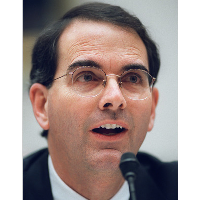Report Reveals Justice Dept. Prosecutors Average 33 Reckless or Intentional Legal and Ethical Violations a Year
 Judge Jay Bybee (photo: Evan Vucci, AP)
Judge Jay Bybee (photo: Evan Vucci, AP)
A report by the Project On Government Oversight (POGO) found that there were more than 400 serious breaches of legal and ethical conduct by those in the Justice Department from fiscal year 2002 through 2013. Some of the violations included misleading courts, failure to provide exculpatory information to defendants and violations of constitutional or civil rights.
In addition, it was discovered that those found to be in violation were punished lightly or not at all when their transgressions were discovered.
The Office of Professional Responsibility (OPR) in the Justice Department compiled the data, some of which was available publicly. Most of the information was requested by POGO through a Freedom of Information Act request.
Among the more prominent violations during the period studied: The production of the “torture memos” by George W. Bush Administration-era Justice Department officials Jay Bybee and John Yoo. According to an OPR report, “Yoo committed intentional professional misconduct when he violated his duty to exercise independent legal judgment and render thorough, objective, and candid legal advice,” and Bybee “committed professional misconduct when he acted in reckless disregard of his duty to exercise independent legal judgment and render thorough, objective, and candid legal advice.” Bybee is now a judge on the United States Court of Appeals for the Ninth Circuit and Yoo is a professor at the University of California at Berkeley School of Law.
Another violation occurred in the prosecution of then-Senator Ted Stevens (R-Alaska). Stevens was charged with failing to report large amounts of gifts. Stevens was found guilty, and subsequently narrowly lost a bid for re-election. He died in 2010. The conviction was set aside when it was found that prosecutors failed to provide evidence that could have assisted Stevens in his defense. One prosecutor eventually served one day of suspension in connection with the violations.
In many cases, it has taken years for OPR to investigate violations by Justice Department attorneys. And when it does reach a finding, it often leads to reduced prison sentences for those prosecuted in those cases.
POGO’s report urged changes in the way OPR handles violations. First, it should notify the appropriate state bars of an attorney’s misconduct. It also suggested that OPR increase transparency of its investigations, making it easier for the public to discover government misconduct. Third, the report urged that the Justice Department’s Office of Inspector General be given authority to investigate misconduct. Currently, that office does not have that power.
-Steve Straehley
To Learn More:
Hundreds of Justice Department Attorneys Violated Professional Rules, Laws, or Ethical Standards (by Nick Schwellenbach, Project On Government Oversight)
- Top Stories
- Unusual News
- Where is the Money Going?
- Controversies
- U.S. and the World
- Appointments and Resignations
- Latest News
- Trump Orders ICE and Border Patrol to Kill More Protestors
- Trump Renames National Football League National Trump League
- Trump to Stop Deportations If…
- Trump Denounces World Series
- What If China Invaded the United States?






Comments